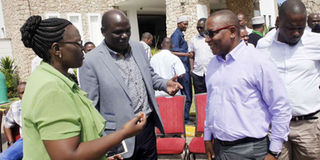Let’s learn from Msando's murder, says IEBC official

From left: Mombasa County IEBC boss Nancy Kariuki, IEBC chairman Wafula Chebukati and Mombasa deputy Governor William Kingi after a post-election evaluation workshop for all the IEBC officers in Coast region on June 28, 2018. PHOTO | LABAN WALLOGA | NATION MEDIA GROUP
What you need to know:
The electoral agency says it did not foresee the fate that met one of its officials before the 2017 vote.
- Audit, Risk and Compliance director Obadiah Keitany urged his colleagues to learn from the murder, saying they too can be targeted.
Mr Keitany said they sought to identify risks and inform the commission so that it can plan properly.
The Independent Electoral and Boundaries Commission (IEBC) wants its officials to "learn" from the 2017 electioneering period during which one of its senior managers was killed.
The electoral agency says it did not foresee the fate that met one of its officials before the 2017 vote.
Audit, Risk and Compliance director Obadiah Keitany urged his colleagues to learn from the murder of the agency's ICT manager Christopher Msando, saying they too can be targeted. “You know ICT officers are always behind the scene, so you would not expect that they would be profiled and killed. This is actually something all of us need to learn from. All of us can be targets,” he warned.
Mr Msando went missing before his body and that of a woman were found in Kikuyu, Kiambu County, a week before last year's August 8 General Election. According to a post-mortem, the ICT official was strangled.
DEATH THREATS
He was one of the few people with crucial information on the IEBC's election preparedness and technology, including knowledge of the location of the commission’s servers. He had earlier reported to Central Police Station in Nairobi that he had been receiving death threats.
Speaking during an IEBC post-election evaluation forum at Pride Inn Paradise Beach Resort in Shanzu, Mr Keitany said they sought to identify risks and inform the commission so that it can plan properly.
“We knew the possibility of a repeat election was very low, so we did not prepare. Another issue was on technology, for example, the opening of the server,” said Mr Keitany.
The official urged IEBC to manage propaganda which it failed to counter during the polls.
He said the election also affected IEBC officials. “I know some people are still healing. If you were attacked or profiled by politicians is there a programme, so that we can reverse the incidents?" he posed.
CRITICAL FUNCTIONS
Mr Keitany cited technology as another big risk which became a major focus for political participants in the last general election which IEBC failed to foresee.
“According to us, election takes place in the ballot box not the server. The server is just transmitting information but it became a very big issue. How could we have communicated that?” he asked.
IEBC chairman Wafula Chebukati said there was need for public vetting of all staff heading critical functions including all the commissioners, senior staff and directors. He said the vetting will be done in-house.
“The commission is developing a methodology. All the stakeholders will be given an opportunity to raise concerns about the agency’s staff,” the IEBC boss said.
The commission also seeks to acquire its own premises to cut recurrent costs through office space rent, hiring of venue for various activities including meetings with players, nomination of candidates, trainings for staff and interest groups and storage.
Mr Chebukati said acquisition of the agency’s premises would in the long run save the Kenyan taxpayers’ financial resources.
OVERLAPPING ROLES
IEBC also wants to take its operations away from the Central Business District due to security concerns in case of demonstrations.
He said the IEBC will undertake institutional restructuring to enhance efficiency and coordination in delivery of the commission’s mandate
Mr Chebukati said the current organizational structure has duplication of functions and overlapping roles causing coordination and accountability challenges.
“The current structure lacks career progression paths,” added the chair.
Mr Chebukati proposed a review of IEBC’s internal processes in tandem with the Public Procurement and Assets Disposals Act, 2015, to make them an open forum for enhanced transparency.
WEAKNESSES
“This will enhance stakeholder participation in the process of procuring goods and services. The current cost of elections in Kenya is very high, which could be partly attributed to pilferage and wastage of public resources through procurement of various goods and services at the commission,” he said.
According to IEBC, the August 2017 was the most competitive general election with a record number of candidates. Some 1,882 elective positions were contested for by 16,259 candidates up from 12,776 in 2013.
He said the forum, and others currently underway across the country, gives IEBC an opportunity to have candid discussions on its performance in the general elections and do an evaluation of what worked well, what did not work, weaknesses and failures seen.





